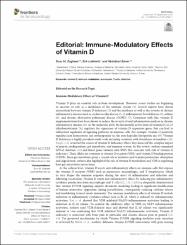Editorial: Immune-modulatory effects of vitamin D

Göster/
Erişim
info:eu-repo/semantics/openAccessAttribution 4.0 Internationalhttps://creativecommons.org/licenses/by/4.0/Tarih
2020Üst veri
Tüm öğe kaydını gösterKünye
Zughaier, S., Lubberts, E. ve Bener, A. (2020). Editorial: Immune-modulatory effects of vitamin D. Frontiers in Immunology, 11. https://dx.doi.org/10.3389/fimmu.2020.596611Özet
Vitamin D plays an essential role in bone development. However, recent studies are beginningto uncover its role as a modulator of the immune system (1). Several reports have shownassociations between vitamin D deficiency (2) and the incidence as well as the severity of chronicinflammatory diseases such as cardiovascular disease (3, 4), inflammatory bowel disease (5), asthma(6), and chronic obstructive pulmonary disease (COPD) (7). Consistent with this, vitamin Dsupplementations have been shown to reduce the severity of and inflammation markers in chronicinflammatory diseases (8). At the molecular level, the hormonally active form of vitamin D (α1,25dihydroxyvitamin D3) regulates the expression of vitamin D responsive genes that can lead todifferential regulation of signaling pathways in immune cells. For example, vitamin D positivelyregulates iron homeostasis and erythropoiesis via the iron-hepcidin-ferroportin axis (9). VitaminD deficiency is highly prevalent world-wide including countries with abundance of sunshine (10).Singh et al. reviewed the causes of vitamin D deficiency where they dissected the complex impactof genetic predisposition, gut microbiota, and immune system. In this review, authors examinedGWAS database (11) and listed genes variants with SNPs that associate with risk of vitamin Ddeficiency. These alleles are common in vitamin D receptor (VDR) and vitamin D binding protein(VDPB). Since gut microbiota plays a crucial role in nutrients and vitamins production, absorptionand degradation, authors also highlighted the role of vitamin D metabolism and VDR is regulatinghost-gut microbiota interactions.


















